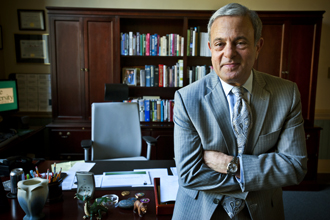Higher education at "crucible moment"?
Noting that a “socially cohesive and economically vibrant U.S. democracy” requires an informed and engaged citizenry, a report released by the National Task Force on Civic Learning and Democratic Engagement is urging colleges to make civic learning an essential part of students' education. According to Tulane provost Michael Bernstein, this call to arms is not a new one.

Provost Michael Bernstein points to a time when the prevailing notion about higher education was “not simply about skill sets for employees but also about creating engaged, reliable, trustworthy, useful citizens.” (Photo by Paula Burch-Celentano)
The report, “A Crucible Moment: College Learning and Democracy's Future,” represents an evolution in thinking that actually “circles back to earlier principles that animated curricular development during the Cold War,” says Bernstein, who also is a professor of history.
“Whether it was training better engineers to make our economy more efficient or training students simply in the fundamental principles of our political and judicial system, college curriculums were all about making strong citizens,” says Bernstein.
The imperative for making strong citizens has waned in recent years, and financial and fiscal pressures “have made it harder for colleges and universities to deliver on this promise of education for democratic citizenry,” says Bernstein, who notes increasing pressure on universities to deliver the more “tangible benefits” of employment opportunity.
“Our notion that education should be the great democratizing influence in our society is up for grabs now,” says Bernstein.
Nevertheless, Bernstein says there are signs that higher education may again be trending toward fostering civic learning and engagement in students, and cites Nancy Cantor, chancellor of Syracuse University, and Tulane President Scott Cowen as among those leading the trend.
“They have been able to catch this civic engagement spirit, and to me it is reminiscent of that Cold War rhetoric,” says Bernstein. “Listen to what Scott says: 'Do for others, not for yourself; make sacrifices for the common good.' This is what our students want and this is what they should be trained to do.”
